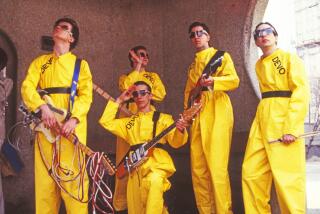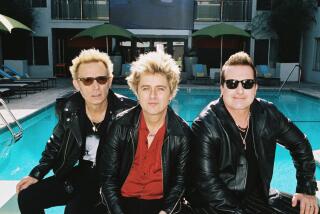For SR-71 Band Members, the Moment Has Arrived
- Share via
It’s 100 degrees on Sunset Boulevard, and Mitch Allan is in the back of a truck, changing his clothes and spending his rushed lunch break talking to a reporter on the telephone.
In a few minutes, the music-video shoot will resume. The cameras will roll, and Allan and his SR-71 bandmates will run down the Los Angeles street in the sweltering midday sun, chased by about 75 “crazed” females.
Is he complaining?
Not at all. The heat, the makeup and wardrobe people fussing over him, the wait between takes--oh yeah, and the girls--are all part of the Deal. For a band that started in Baltimore just five years ago, shooting a video for a hit single and securing a contract with one of the world’s biggest recording labels is a pretty sweet place to be.
“I’m sure 10 years from now, when I’m more experienced, I may have something negative to say about fame and stardom, but right now this is a dream come true,” says Allan, 28, SR-71’s vocalist and lead guitarist. “It’s everything we ever talked about.”
The band’s debut on RCA Records, “Now You See Inside,” hit store shelves this week. But its first single, “Right Now,” has been on the charts for five weeks and is No. 19 on Billboard’s Modern Rock listings, to Allan’s surprise.
“I think the record’s great, but we never expected this reaction this soon,” he says.
The rapid rise seems fitting for a band named after a stealth aircraft known for being the fastest plane ever built. Or maybe the rise just seems to have been rapid; in truth, it took five years to build SR-71.
In 1995, Allan teamed up with guitarist Mark Beauchemin, 29. They recruited bassist Jeff Reid and drummer Dan Garvin, both 27, to form Honor Among Thieves. The group became a Baltimore mainstay, playing regularly throughout the city. An independent CD was released in 1996, and the group spent the next few years touring the East Coast. The band members had their own van and trailer, their own studio and all the creative autonomy they wanted. They also had the increasingly tedious burden of looking after business.
“We became the record company. We became businessmen,” Allan says. “It’s terribly stressful.”
So in November 1998, the foursome regrouped with one goal in mind--securing a major record label deal. A new manager was enlisted, and within four months, the two-record RCA deal was clinched. The band’s lawyer, Allan says, told them it was one of the largest contracts ever secured by an unknown act.
Allan credits manager Andy Martin for connecting the band with the right people, which led to playing showcases for big-label bigwigs. On the advice of its lawyer, the band took an unorthodox approach to negotiations, sending proposals to record labels instead of sitting back and waiting. Allan says responses quickly poured in from about 10 major labels.
“It exploded,” he says. “Everybody was rushing to get their offers back in.”
Having the RCA machine behind them has made all the difference, Allan says. A tidy advance allowed the foursome to quit their jobs working construction, teaching music lessons and, in Allan’s case, running his own recording studio. They focused on honing vocals and tightening their act.
SR-71’s debut album was produced by Gil Norton, whose credits include the Foo Fighters and the Pixies. Allan says Norton taught the band the subtleties of studio work and was instrumental in crafting an album of radio-friendly power pop. Most significant, being signed to RCA meant exposure. “There are very few bands on small labels that reach a mass audience,” Allan says. “There are exceptions, but for the most part the biggest bands in the world are signed to the biggest labels in the world.”
The name change followed. Allan says he was happy with the band’s former name and pre-RCA existence, but securing a major record deal gave his career a certain legitimacy. “There’s a goal I set out to meet 10 years ago when I started playing,” he says. “It’s made me walk with my head up straight.”
The next few months are booked with concert dates and promotions, and choosing among them requires careful decisions. The band’s youthful, clean-cut image lends itself to inevitable comparisons to ‘N Sync and the Backstreet Boys, but the band drew the line at appearing in “teeny-bopper” magazines. “I think you always get spillage into other markets, especially when you play pop music, and that’s great, but I just don’t think we should market the band that way,” Allan says.
But filming a music video on Sunset Boulevard? That’s far more attractive from an image standpoint, even though the makeup sessions may take a little getting used to.
Shortly before the video shoot resumes, Allan suddenly looks down. “Oh, no,” he says. “I have all this makeup on my face, and I just rubbed my face on my pants. I’m an idiot.”
More to Read
The biggest entertainment stories
Get our big stories about Hollywood, film, television, music, arts, culture and more right in your inbox as soon as they publish.
You may occasionally receive promotional content from the Los Angeles Times.










